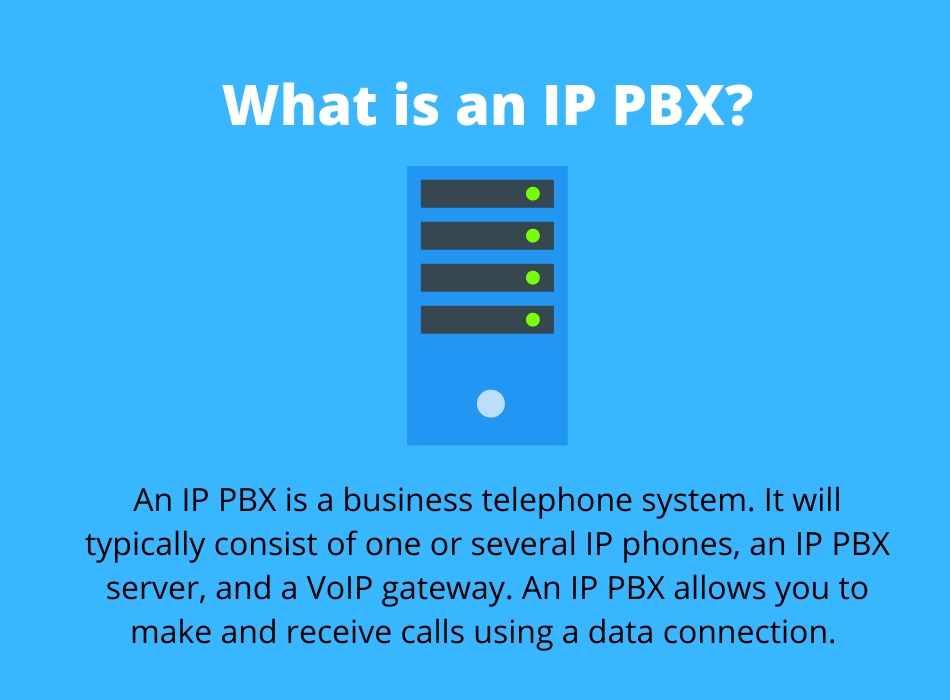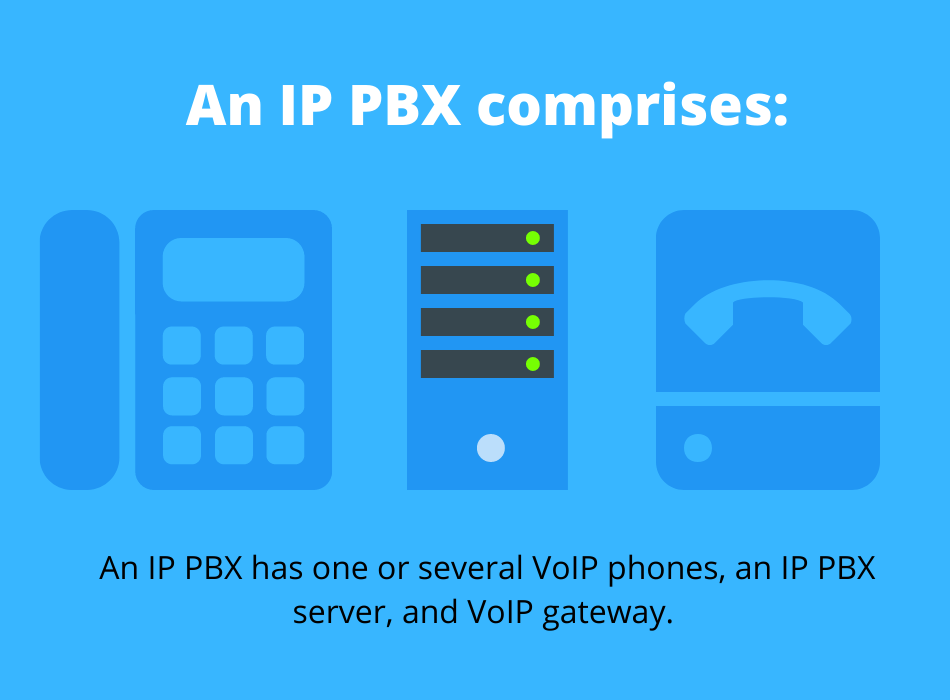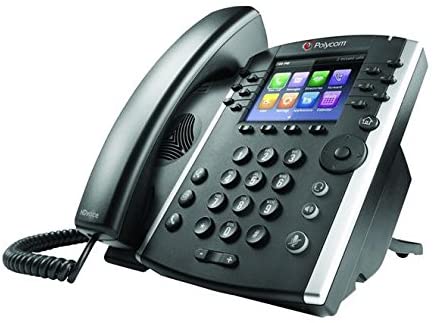Traditional telephony is on the way out, with most businesses moving over to IP phone systems. However, for those businesses that haven’t moved over yet, what is an IP phone system?
What is an IP phone system? An IP phone system is a telephone system that transmits calls over the internet rather than the traditional public switched telephone network.
By the time you’re done reading this article, you’ll know all you need to know about IP phone systems. Want to know more about what an IP phone system is, how it works, or why your business should move over to one? Keep reading.
What Is An IP Phone System?
An IP phone system, from a user’s perspective, is very similar to a traditional phone system that connects to the PSTN. An IP phone system, also known as an IP PBX, allows you to make and receive HD voice calls but offers more functionality than a traditional phone system.

As with a traditional phone system, an IP phone system is the gateway between your office and the outside world. All incoming and outgoing calls travel through the system and are diverted to their destination.
Depending on the requirements of your business, an IP phone system can be set up in a variety of ways. For example, you may utilise softphones rather than physical IP phones. However, no matter which type of phone you use, the system works the same way.
So how exactly does an IP phone system work?

How Does An IP Phone System Work?
As I said earlier in this post, to the users of an IP phone system, it won’t seem any different to using a traditional phone system. However, the differences between a traditional and IP phone system are substantial. To explain what I mean, let’s take a look at how an IP PBX works.
At the heart of any IP phone system is the IP PBX server. The IP PBX server is essentially a conduit, responsible for routing calls to their destination whether internal or external. External calls route to the VoIP gateway, which can be something you have onsite. Alternatively, you can use a VoIP service provider’s gateway.
Internal calls work differently. During the configuration of the IP PBX server, you register the SIP addresses of the clients with the server. The server contains the SIP addresses of every VoIP client. So when an internal call is made by one user intended for another within the same network, the server routes the call to the SIP address of the user receiving the call.

The VoIP gateway is an important part of the system, because it connects your IP system to the PSTN. With so many businesses still using traditional PSTN, it’s important to maintain this connection.
VoIP gateways are capable of connecting to either analog lines or digital lines. It’s also worth noting that the gateway can be a separate piece of hardware, or it can be something built into the server.
So with all of the following, you have your IP PBX:
- IP PBX server
- VoIP phone(s)
- VoIP gateway (onsite or through a VoIP service provider)
Do I Need A PBX For VoIP?
Do you actually need a PBX for VoIP? This is a question that pops up time and time again for several reasons. One of the main reasons is concern over how much all this equipment is going to cost. Some businesses simply don’t have the money to invest heavily in new phone equipment.
In a word, no. You don’t require a PBX for VoIP. VoIP is highly accessible to businesses of all sizes and even domestic users because you don’t require loads of expensive equipment.
What You Need To Use VoIP
There are only two things you need for VoIP:
- VoIP Phone
- Internet Connection
Providing you have both of these, you have everything that you need for VoIP.
As I briefly mentioned before, the term VoIP phone covers numerous devices. A VoIP phone can be an application on any internet-enabled device with a speaker and microphone, such as a smartphone, laptop or desktop PC (when paired with a headset).
A VoIP phone can also be an IP phone, which is a device that sits on your network. IP phones are very similar to analog telephones, so your staff can easily adjust to them without a learning curve. Pictured below is the Polycom VVX 411, a widely used IP phone.

Moving on, the second minimum requirement for VoIP is an internet connection.
Any internet connection will allow you to use a hosted PBX and therefore make and receive calls over the internet. For example, you can use a 4G or 5G mobile broadband data service.
Obviously, some internet connections are more suitable than others. The type of internet connection you need really depends on the number of concurrent calls you’ll be making, as well as the other processes that are using the same connection.
It is suggested that you must have 100Kbps upstream and downstream of dedicated bandwidth per call. So if you have 10 calls, you need 1Mbps of dedicated bandwidth up and down. However, this depends on the codec that you are using. And you must make sure that you have dedicated bandwidth; if you don’t have the required bandwidth, expect poor quality calls.
If you want to read more about how the codec you use influences the amount of bandwidth needed per call, I’ve written a blog post titled What Is A VoIP Codec that tells you all you need to know.
Should Your Business Move Over To An IP PBX?
Now I’ve covered all the information about what an IP PBX is, you’re probably wondering whether your business should begin using one.
There’s no one answer to this question. The answer will be based on variables such as:
- The size of your business
- The number of employees you have
- The number of calls you make/receive concurrently
- The type of system you are currently using
- The equipment you already own
An easier question to answer is: should your business start using VoIP? My response to this question is always the same: Yes, your business should start using VoIP.
Telecommunications providers across the world are focusing on internet telephony, with traditional telephony going out the window. In the UK, BT are switching off their ISDN and PSTN networks for good. In the US, the POTS switch-off is in view. In other countries, such as Switzerland, Germany and Greece, the change to all-IP phone systems has already been made. Eventually, you’ll be forced into changing your telephone system. You may as well change it in your own time rather than being forced into the move.
Whether or not you need an IP PBX is for your business to decide. However, here are some pointers that might help you make the decision.
- Do you have a lot of employees, including IT personnel? For most businesses with a large number of employees and their own IT departments, it makes sense to invest in an IP PBX. When you have an on-site telephone system, you are responsible for maintaining it yourself. If you have an IT department, they will have the skills to manage it for you.
- Do you make a large number of calls at any given time? If you are always making and receiving a large number of calls, your telephone system must be an important business asset. As will all assets essential to your business operation, it makes a lot of sense to have as much control as possible over your phone system. For this control, it makes sense to have an IP PBX where you manage the equipment yourself on-site.
- Can you afford to purchase your own equipment? If you can afford to purchase your own telephony equipment, it often makes sense to do so. If you cannot afford your own equipment, then a hosted solution makes more sense. A hosted PBX offers all the functionality of an onsite PBX, without the need to have any equipment in your building.
More About VoIP and IP PBXs
You’ve decided to invest in an IP PBX and you’ve come across SIP trunking. If you want to understand more about what SIP trunking is and how it works, What Are SIP Trunks will help you. This blog post explains what SIP trunks are and how they work with an IP PBX. SIP trunks are often essential to how an IP PBX works, so you need to understand what they are.
You’re still unsure over VoIP and want to find out more about the benefits and the drawbacks. My blog post, What Are The Advantages And Disadvantages Of VoIP, can help you. As you may have guessed from the name, it contains plenty of information on the advantages and disadvantages of using Voice over IP.
